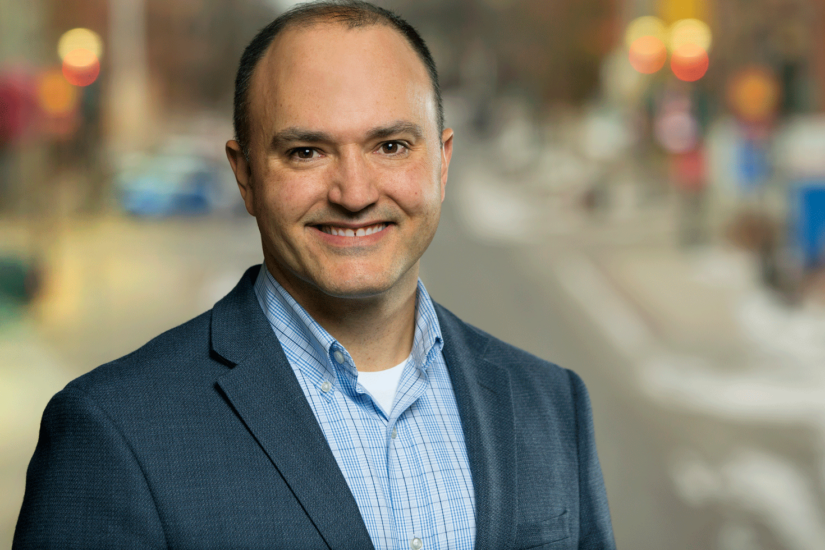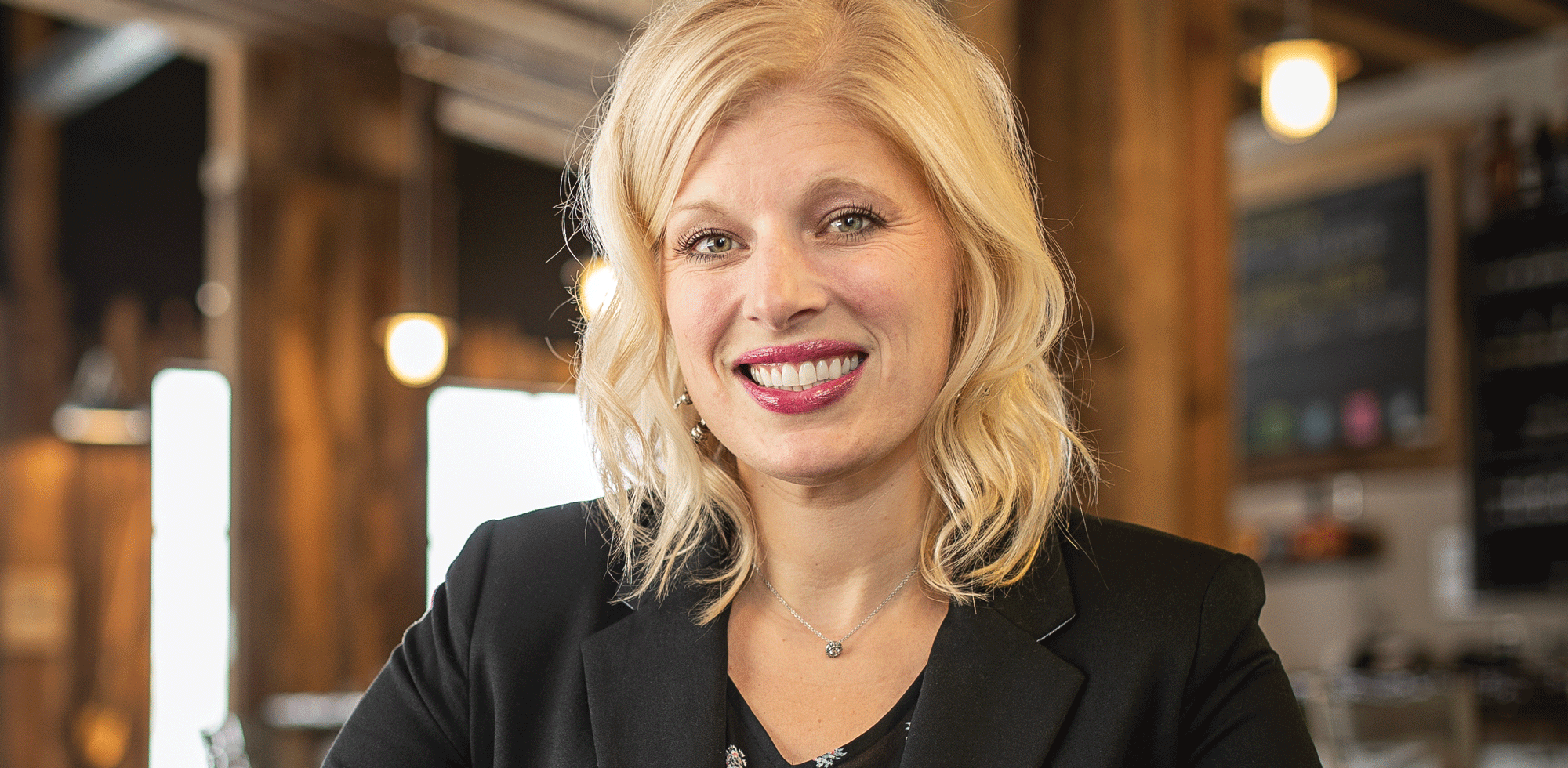
Initiating Change 2.0
Initiators Fellowship expansion brings social entrepreneurship to more of Greater Minnesota.
By Elizabeth Foy Larsen | Photography by Paul Middlestaedt and John Linn
Growing up on a farm in rural Benton County, Rick Bauerly’s network of supportive relationships set him on the path for future success.
“I was blessed with great parents, teachers, coaches and mentors,” said Bauerly, sitting in the conference room at St. Cloud-based Granite Equity Partners, the private investment and holding company he founded and where he serves as chief executive officer. In fact, Bauerly says it was this cheering squad that made him believe he could succeed at college, in his case Saint John’s University in Collegeville and then to Harvard University, where he received master’s degrees in business and public administration.
It was while studying at Harvard that Bauerly was introduced to Echoing Green, a nonprofit organization based in New York City, which for more than 30 years has identified and supported emerging leaders and social entrepreneurs—including Michelle Obama, who was awarded a fellowship in 1993, and Teach for America founder Wendy Kopp, who was awarded a fellowship in 1991. Unlike other nonprofits that support entrepreneurs, Echoing Green doesn’t invest in business plans. Instead, it invests in the people behind the business plans, which makes sense when you consider that just 10 percent of start-up companies make it past the five-year mark. Equipping emerging leaders with the tools and mindset they need to try—and try again— is what matters.
The Echoing Green concept made sense to Bauerly, who had considered applying for a fellowship while still at Harvard. His plan changed when his family asked him to move back to Central Minnesota to support the family business, Bauerly Companies, which produced aggregate, asphalt and concrete products. After the company merged with Knife River Corporation in 2001, Bauerly founded Granite Equity, which focuses on owning Minnesota companies when the owners want to retire. “Granite Equity’s mission and spirit grew out of the notion of keeping local ownership of Minnesota’s great family businesses,” he said. “When local businesses get sold to larger national companies, there often isn’t the same community commitment that local ownership brings.”
A Merger of Community Spirit
In 2014, the Initiative Foundation was researching ways to promote a local culture of entrepreneurship and social enterprise in Central Minnesota. Bauerly, a member of the Foundation’s Board of Trustees, was at these meetings and suggested that the Echoing Green model could be put into play. “There are people of great purpose and passion in our region,” he said. “We needed to develop a program to back those people and help them reach their potential.”
With a mentoring framework based on the Echoing Green model and a generous contribution from Granite Equity Partners, the Foundation launched the Initiators Fellowship program in 2016. The first four fellows each received $30,000 annually for two years along with mentoring, customized small-group training and professional development support to advance their business endeavor.
“The rigor of the mentoring within the Initiators Fellowship is incredibly unique in the social enterprise space,” said Andrea Davila, a former Echoing Green deputy director who now makes her home in Minnesota and supports the Initiators Fellowship as a program advisor. “To have business and community leaders who are so consistently willing to volunteer time and talent to support emerging social entrepreneurs speaks to the strength of the community in Central Minnesota.”
Matchmaking
The Initiators Fellowship was a game-changer for Fergus Falls native Annie Deckert, president and co-founder of Decklan Group, an economic development consulting business that acts as a matchmaker between established businesses and local governments. As a former director of economic development in Elk River, Deckert knew the ways in which Minnesota communities could best improve their economic development efforts. But she wasn’t always effective at conveying to businesses how Decklan Group could assist them.
“Through my work with the Initiators Fellowship I learned that all of the difficult parts of that process—from zoning regulations to economic services—can feel very overwhelming,” she said. “Before starting the fellowship, my pitch involved explaining all the details of how I worked with complex programs. I realized the reason companies hire Decklan Group is because we can take care of those details so they can focus on running and growing their operations.”
With that key insight, Deckert worked with her mentor, Elk River attorney and Initiative Foundation Trustee David Monroy (see page 20), to streamline her pitch. “I scrapped every PowerPoint slide,” she said. “I realized I had to tell a story that was more authentic and genuine about what Decklan Group does.”
With support from Monroy and her cohort of fellows, Deckert refined her approach. And although she is naturally so energetic that it’s hard to imagine her having a moment of doubt, Deckert says the program helped her be more self-assured. “My partner says he can see a dramatic increase in my confidence,” she said. “I can see it too, I rarely get nervous anymore when I’m pitching a potential client.”

Decklan Group’s new approach has clearly worked: Since starting the fellowship in 2016, the business has grown from 70 clients in 25 communities to 112 clients in 41 communities.
Now that the two-year fellowship is completed, Deckert is part of an alumni cohort—her group of fellows includes learning technology entrepreneur Rod Greder, diabetes advocate Quinn Nystrom, and cultural connector Hudda Ibrahim—from which she continues to draw support. “I’m an open-minded person in general, but knowing the other fellows has definitely broadened my worldview,” she said. “I’m so much more connected in Central Minnesota now.”
Expanding Opportunities
The Initiative Foundation believes that t e ongoing alumni connection will become part of a collective advisory team—a sort of brain trust—to bolster leadership and social entrepreneurship throughout the region. A second Initiators Fellowship cohort will be selected later this year.
“The emerging trend is to accomplish social good through for-profit businesses,” said Jeff Wig, Initiative Foundation vice president for entrepreneurship. “Our approach is to support nonprofit and for-profit ventures, as long as the entrepreneur has social purpose hardwired into their DNA.”
Social entrepreneurs in Greater Minnesota often lack access and a network of support—and may not even realize they are social entrepreneurs. “They don’t connect with other social entrepreneurs because the concept isn’t established in rural areas,” Wig said. “The Initiators Fellowship will create a culture of social entrepreneurism that will make sense in a rural landscape.”
Growing Greater in Greater Minnesota
This past January, the Southwest and West Central Initiative Foundations signed on as Initiators Fellowship partners. The arrangement will expand the program to even more of Greater Minnesota (41 counties, in fact), bringing the social entrepreneurship concept to a larger audience. The expansion is supported by a seven-year, $1.4 million grant from the Bush Foundation and other donors as well as additional generosity from Granite Equity Partners.
“We expect that Initiator Fellows from our region will become ambassadors for the movement, demonstrating how and why this kind of entrepreneurship is valuable and contributes to both the social and economic vitality of West Central Minnesota,” said Anna Wasescha, president and CEO of West Central Initiative. “We hope that this program will provide exactly the kind of support that entrepreneurs in our communities need to take their very good ideas and preliminary hard work to the next level.”
Diana Anderson, president and CEO of Southwest Initiative Foundation, agrees. “Economic and social growth are interdependent,” she said. “Economic and social gains must be pursued simultaneously for individual initiatives and communities—and the overall region—to thrive. We are excited to intentionally foster social enterprise through the Initiators Fellowship.”
“Young and diverse entrepreneurs already are contributing to our regional economy and rich fabric of our communities,” she added. “Investing in their innovative ideas—not just with financial support, but through an incredible network of intellectual and emotional support—will only increase their likelihood of success and their long-term commitment to staying in our region.”
Rick Bauerly believes the program will jumpstart a new legacy for Greater Minnesota. “The Initiators Fellowship really helps institutionalize mentoring for some of the most passionate and purposeful entrepreneurs and leaders—people who initiate change and improvement and progress in our communities,” he said. “We are backing these people with the hope that they will develop a lifetime relationship with their region so that when they are going to start a new business or nonprofit, they will base it here—and grow it here.”
Visit fellows.greaterminnesota.net to learn more about becoming a fellow or a mentor through the Initiators Fellowship. Recruitment for the Initiators Fellowship gets under way in April 2019.
WHAT IS SOCIAL ENTREPRENEURSHIP?
Entrepreneurs who innovate and launch a business are adding value to society by creating jobs while providing sought-after goods and services. Many demonstrate social responsibility by donating to charities. Social entrepreneurs, on the other hand, have identified a social or environmental issue that they’re passionate about,
and they bake their social mission into the heart of their business. “The mission and the issue come first,” said Jeff Wig, Initiative Foundation vice president for entrepreneurship, “and the business is shaped to support that mission and vision.”